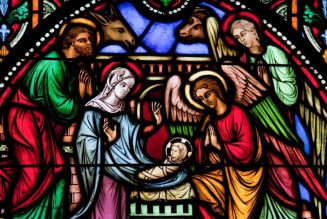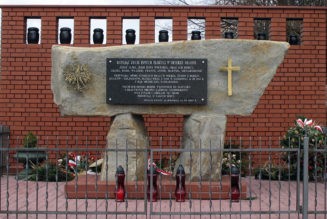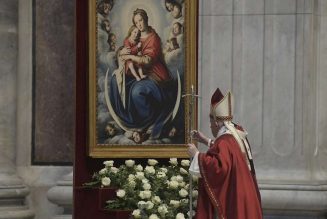|
Listen to this story: |
ROME – A terse two-line statement from the Vatican on June 15, announcing that Pope Francis has decided to send Archbishop Georg Gänswein back to his home diocese without any indication of a new assignment, has been widely interpreted as a papal rebuff to the 66-year-old German prelate.
In effect, it makes Gänswein the most famous unemployed Catholic bishop in the world. One Italian political journalist summed up the pope’s message this way on national television: “I may have a bum knee, but by God, I’m still in charge.”
It’s a completely reasonable reading of events, since Gänswein made himself a lightning rod through a tell-all book after the death of his mentor, Pope Benedict XVI, as well as a series of media interviews, all of which highlighted various ways in which he’s been at odds with the Francis papacy.
Gänswein now is set to return to the Archdiocese of Freiburg, where he was ordained in 1984. If nothing else, that’s perhaps a small mercy for the conservative Gänswein, given that Archbishop Stephan Burger is among the minority of German bishops opposed to the blessing of same-sex unions and in favor of maintaining celibacy for priests.
It is indeed striking that Francis didn’t bother with the usual face-saving maneuver of finding some official role for Gänswein, however nominal. While critics of the pontiff may simply chalk that up to vindictiveness, others have wondered about the wisdom of it all, under the heading of keeping one’s friends close and enemies closer.
Why wouldn’t Francis try to tether Gänswein a bit more tightly to his authority, by placing him in a role that would require at least some measure of discretion?
In that light, it’s worth pondering the implications of sending the heir to Benedict XVI back to a country with arguably one of the most progressive internal Catholic cultures in the world, as reflected in its über-controversial “synodal way,” and without any encumbrance that would oblige him to pull his punches.
Let’s bracket off for a moment the question of how much of this was intentional on Pope Francis’s part, and focus just on the likely consequences.
To begin with, Gänswein returns to Germany as the de facto keeper of the flame for the memory of Pope Benedict XVI, the first German pope in a millennium, at a time when the German church seems almost systematically committed to undoing his legacy.
During its “synodal path,” the German church defied repeated Vatican yellow lights, adopting measures such as the blessing of same-sex unions ahead of Pope Francis’s own synodal process. In effect, the Germans appear to have embraced the time-honored strategy of attempting to influence negotiations by creating facts on the ground.
However irritated Francis may be by all that, the fact remains that German prelates have been key supporters of the pontiff at several important moments, including his controversial synods on the family – the original impetus for opening up communion to remarried divorcees, for example, came from German Cardinal Walter Kasper, and is a fruit of the pastoral experience of the German church.
Moreover, because of the church tax system in Germany, the German church has vast resources at its disposal and sometimes almost single-handedly keeps local churches afloat in parts of what was once considered mission territory. No one understands that better, probably, than history’s first pontiff from the global south.
So, Gänswein enters the scene at a time when the pope doesn’t seem to want a full-blown confrontation with Germany, but may not be entirely delighted with its “go-it-alone” philosophy either.
Sure, Francis could have sent Gänswein home as a diocesan bishop – both the Archdioceses of Paderborn and Bamberg are currently vacant, so it would have been a fairly easy thing to do. In all probability, Francis didn’t want to appear to reward someone he regards as having created a public embarrassment at the time of Benedict’s death.
However, sending him back without such a role may turn Gänswein into an even more formidable source of resistance to the German church’s prevailing liberal consensus. As a member of the bishops’ conference, Gänswein might have been influenced by the gentleman’s club ethos to bite his tongue.
As it is, he’s a free agent, and one with a huge megaphone.
Now for the $64,000 question: Is this what Pope Francis had in mind, or is just an ironic illustration of the old rule, “Be careful what you wish for, because you will surely get it”?
First, we probably shouldn’t rule out that Francis indeed considered the implications of sending Gänswein back under these circumstances. Never forget that beneath his humble, simple exterior stirs the mind of an extremely crafty Jesuit politician, and so the prospect of both snubbing a perceived foe and creating a new speedbump in the German church at the same time may well have appealed.
Second, and perhaps more importantly, it really doesn’t matter what Francis intended. The fact of the matter is that like ex-papal secretaries before him, Gänswein likely will see it as his role to foster his pope’s legacy. In today’s German Catholicism, doing so inevitably will inject a new and alternative voice in the country’s debates.
In that light, here’s the lay of the land: A transitory committee of 74 people, clerics and laity, is currently examining the establishment of a permanent German synodal council in the wake of the synodal way, and is due to complete its work in three years.
While it’s hard to say what might come out of that effort, one thing seems certain: The German conversation should be much more interesting with Gänswein in it .. and, for better or worse, Francis will be the pope who put him there.








